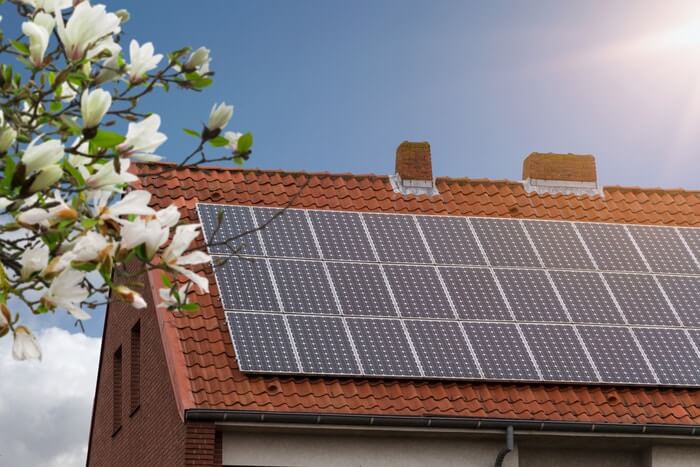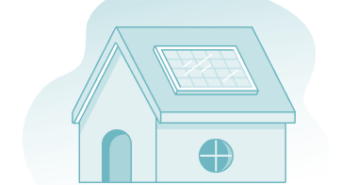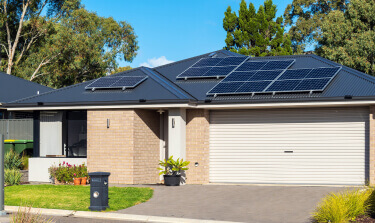What Is Solar Net Metering?
Solar net metering is a smart, rewarding way to get the most out of your solar panel system. It works by sending extra electricity your panels produce back to the power grid, sometimes even letting you sell solar energy back to the grid. In return, you earn credits that can lower your utility bills. Think of it like watching your electric meter spin backward. With net metering, you gain more control over your energy use and can enjoy real savings each month.
How to Sell Electricity from Solar Panels
How does net metering work? On a sunny day, your home might not use much electricity. Maybe no one is home, the lights are off, and the appliances are idle. Even then, your solar panels are still working, producing clean energy throughout the day. So what happens to all that extra energy?
If your home is set up for solar net metering, that unused electricity flows through your electric meter and out to the grid. A digital meter tracks power moving both ways: What you use and what you send back. With net metering, you only pay for the “net” amount of electricity you use, after subtracting the extra energy you sold back to the grid. It’s a simple way to increase your return on investment and make your solar energy system work even harder for you.

Factors to Consider Before Starting Solar Net Metering
From a consumer’s point of view, it seems like a no-brainer. You use what energy you need, and you have a market ready to buy up your surplus energy, which lowers your overall electric bill. However, there are still some factors to consider before you start solar net metering.
Net Metering State Laws
Whether you can take advantage of solar net metering depends on where you live. Not every state has the same rules, and policies can vary widely, even between utility providers. Right now, 44 states and Washington, D.C. require utilities to offer net metering in some form. However, Alabama, Mississippi, Tennessee, and South Dakota don’t have statewide net metering policies. And while Texas and Idaho don’t have mandatory programs, some cities and energy providers in those states do offer net metering options.
Solar Energy Rollovers and Reimbursements
It’s not enough to know if your state or utility company allows net metering. You also need some understanding of the fine print, since not all net metering programs are created equal.
Ask your utility company these questions:
- Will the net metering credit be rolled over from month to month?
- What happens to unused credits at the end of the year? Do they expire? Are they paid out at a lower rate than monthly surpluses?
- Does the utility company charge a monthly connection fee?
- How much will they credit you for the extra power your system sends back to the grid?
Most states credit homeowners at the full retail rate for any extra electricity their solar panels produce. That means the utility pays you the same rate it charges when you use power from the grid. However, around 10 states use what’s called an “avoided cost rate” instead. This rate is based on what it costs the utility to generate electricity, so it’s usually lower than the retail rate.
Limits on Selling Solar Energy
You should also check and see if your utility company or state impose limits on how much surplus electricity you can sell back to the power grid. Many states have limits. Knowing the cap might help you decide how many solar panels you want to install. On the other hand, if solar net metering limits are generous, or non-existent, you might decide to install a larger solar panel system to maximize your energy production and savings.
However, net metering should not be the primary consideration when designing a household solar panel system. It’s usually more cost effective to focus on roof angle, orientation, and area, as well as your average electricity usage, when sizing your system. Remember that when you install a solar energy system, there are options for upgrading to solar home heating and cooling, solar pool heater installations, and more.

It’s always a smart move to speak with a local solar professional to understand your current net metering options. Rules can vary by utility and may change over time. For example, in Virginia, most utilities cap residential solar systems at 25 kilowatts (kW). Some, like Dominion Energy, allow systems to be sized up to 150% of your home’s electricity use over the past year, which can be helpful if you’re planning for future needs like an electric vehicle. Other utilities in the state may require your system to match your previous 12 months of usage. Staying informed helps ensure your system follows the latest guidelines and delivers the best return on your investment.
Is Solar Net Metering Worth It?
For many homeowners, yes, solar net metering can be a big win. It’s one of the most effective ways to lower your monthly electric bill and get more value from your solar system. When your panels make more electricity than your home needs, that extra energy goes back to the grid. In return, you earn credits that help reduce what you owe.
Whether net metering makes sense for you depends on a few key factors:
- Your State’s Policies: Some states offer full retail credit for extra power, while others pay less.
- Your Utility Company: Check for any monthly fees or limits on how credits are applied.
- How Much Energy You Use: When your panels produce a lot of extra energy, you earn more back.
- Electricity Rates: Higher rates usually mean more savings from net metering.
- Your System Size: Larger systems often create more surplus power, which can increase your credits.
If you live in a state with strong net metering rules and your system regularly produces more than you use, it’s a smart way to save. Plus, you’ll make your solar investment work harder for you.
What Are the Disadvantages of Net Metering?
While solar net metering offers big benefits, it’s not always a smooth path. In some areas, utility companies are less supportive of rooftop solar. Why? Because when you produce your own electricity, you buy less from the grid. That can affect their bottom line.
Some utilities own costly power plants and worry that more solar adoption could leave those investments underused. As a result, a few utility companies have added fees or reduced incentives for solar customers. For example, one Arizona utility added a $50 monthly demand charge for solar users, making it more expensive to go solar.
Other utilities may try to lower credit rates or push for less favorable policies. These changes can impact your savings. That’s why it’s important to research your local utility’s stance on solar before you install a system. Talking to local solar installers or advocates can help you find out if your utility is solar-friendly and what to expect over time.
The Outlook for Solar Energy Is Bright
Don’t let potential challenges discourage you. Solar energy has strong support across the country, from the federal government to local city leaders. Clean, renewable energy is a growing priority, and the momentum is on the side of homeowners.
Solar panel prices have dropped significantly in recent years, making systems more affordable than ever. Many states and cities offer rebates and incentives to help with costs. Flexible, consumer-friendly financing options are widely available. Plus, the industry has grown. There are now many experienced, trusted solar installers ready to help guide you through the process.
Compare top-rated solar pros in your area.
Read real homeowner reviews, explore qualifications, and view promotions. Modernize makes it easy to browse professionals and find one that will be perfect for your project.








